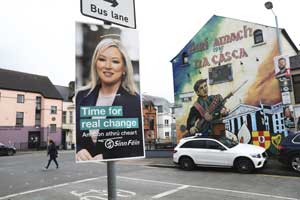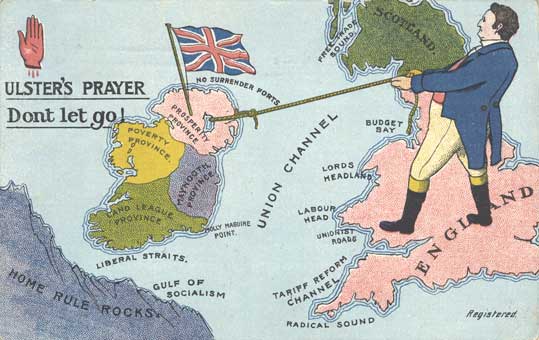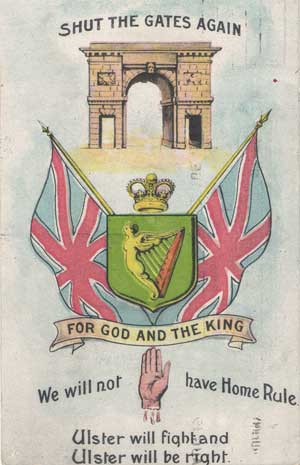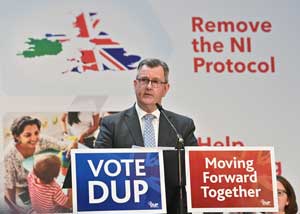Who speaks for Ulster? Similarities between elections in Derry 1913 and Northern Ireland 2022
Published in Features, Issue 5 (September/October 2022), Volume 30By M.C. Rast

Above: Sinn Féin became Northern Ireland’s largest party in May 2022 promising ‘real change’, but does victory mean they control the agenda? (AP Photo/Peter Morrison)
The May 2022 Northern Ireland Assembly elections were historic. Sinn Féin became the largest bloc with twenty-seven seats and the cross-community Alliance Party third largest with seventeen. The Democratic Unionist Party (DUP) lost three seats for a total of twenty-five, forcing it into second place. These results are significant, but this is not the first-time unionists have been outnumbered in Ireland’s northern constituencies at a critical time. Unionists lost the majority of Ulster’s parliamentary seats during the Third Home Rule crisis. However, due to their political capital in Britain, they dominated the debate regarding self-government and partition. Today, the DUP’s interpretation of the Northern Ireland Protocol in the Brexit Withdrawal Agreement between the United Kingdom (UK) and the European Union (EU) is gaining in influence, despite demonstrable weakness in their popular support on the issue. These examples show that a party’s electoral performance does not necessarily impact its ability to control the political agenda, especially if its rhetoric or goals complement those of larger organizations.
The high stakes of representing Ulster
At the beginning of 1913, seventeen Unionists and sixteen home rulers—Irish Parliamentary Party (IPP) or Liberals—represented the nine-county province of Ulster in the UK parliament at Westminster. The stakes for representing Ulster had never been higher. Under pressure from John Redmond and the IPP, Prime Minister Asquith’s Liberal government introduced the Third Home Rule Bill in April 1912. British and Irish unionists had spent years proclaiming that Ulster was Protestant unionist territory. Their spokesmen rarely acknowledged the province’s nationalists or Liberals, and when they did emphasized their minority status or derided them as misguided pawns of Catholic priests or professional agitators.
Such assertions were designed to influence British audiences. The overwhelming preponderance of British parliamentary representatives meant that Irish self-government would be decided in the ‘predominant partner’; both sides oriented their language accordingly. Efforts to convince Britons that Ulster was wholly unionist served a definite purpose: if there was a compact, homogenous population alienated from nationalists and determined to resist home rule, Irish self-government was unworkable; only Westminster could ensure evenhanded governance.
On 1 January 1913, Irish Unionist leader Edward Carson proposed an amendment to exclude six Ulster counties from the Home Rule Bill, thereby partitioning the island. He admitted that ‘in some of the counties of Ulster there is a preponderating majority against us’. Nonetheless, he claimed to speak for ‘the people of Ulster’ and described ‘the position of Ulster’ as pro-Union. It would be a practical and moral disaster to ‘force Ulster’, meaning unionists there, to accept home rule, not least because they and their British supporters would resist violently. He was, however, willing to force six-county home rulers to accept continued Union with Britain. The proposal was tactical; the Unionist Party intended to use Ulster to incite popular indignation in Britain against Asquith’s government, sweeping them into office at the next election. Carson’s simplistic rhetoric was how unionists wanted Britons to perceive Ireland’s northern province.
Two days after Carson’s speech, the Duke of Abercorn died of pneumonia. His son, James Hamilton, had to vacate his position as MP for Londonderry City to replace him in the House of Lords. Suddenly, while the home rule debate raised issues concerning the nature of representative and democratic governance, a by-election in Derry risked unionists’ slim Ulster majority. A loss might undermine their claims to speak for the province.

Above: Unionist propaganda, particularly aimed at Britons, portrayed the entire province of Ulster as against Home Rule. (National Museums NI)
The by-election and its significance
Londonderry City was not a safe unionist seat. The location held great emotional significance. Irish unionists celebrated the 1689 siege of Derry as a symbol of implacable resistance to Catholic power. Centuries later, evocative slogans like ‘no surrender’ and ‘shut the gates’ were used as metaphors against self-government. Nevertheless, practical factors pointed to a possible home rule victory. Derry’s population was majority Catholic. The IPP represented the constituency as recently as 1899. Hamilton won three contested elections by an average of only 76 votes. In 1913, the IPP backed Liberal David Hogg. A Presbyterian and well-established industrialist, he was a strong choice; home rulers across Ulster were hopeful. Presbyterian minister J.B. Armour of County Antrim wrote gleefully to his brother, ‘If Hogg gets in, the Unionists of the three kingdoms will be in a state of consternation’.
After an unremarkable campaign, Hogg got in by just 57 votes. Local home rulers’ reactions were muted. Hogg confined his victory speech to thanking supporters, especially Protestants. The Derry Journal counselled readers to enjoy the win but avoid provoking their unionist neighbours.
Ulster unionists were incensed, not merely that they lost, but statistics suggested some Protestants supported Hogg. The Belfast News-Letter called the by-election a ‘serious blow’ and Protestant home rulers ‘deplorable’. Mid-Armagh MP and Ulster Unionist Council (UUC) member John Lonsdale ascribed the loss to ‘weak-kneed Protestants’. This palpable anger came partly from an awareness that the circumstances undermined their portrayal of Ulster as overwhelmingly, if not uniformly, unionist. A mere 57 votes might be seen as evidence that unionists did not represent the whole province or even all Protestants there.
Reactions from the British Liberal press likely validated these fears. The Daily Chronicle declared, ‘Londonderry has demolished one of the favourite Tory arguments against Home Rule’, calling the election, ‘evidence of the decline of the opposition in Ulster to self-government for Ireland’. The Manchester Guardian said the vote proved partition was untenable, ‘now that the Mecca of Ulster Unionism has declared so unmistakably for Home Rule’. London’s Daily News provided the most caustic comments, ‘The Unionism of Ulster, which figures so fantastically in the literature speeches of Toryism, is little more than prejudice and bigotry’.
Some unionists downplayed the poll. London’s Saturday Review insisted, ‘Derry is a bore. The election has no real significance’ and claimed nationalists had ‘stolen’ the seat. National Review editor, Leo Maxse, was usually outspoken on Irish affairs. He was one of the first writers to consistently use ‘Northern Ireland’ as a synonym for Ulster, employing the phrase as early as October 1911. His editorials portrayed Ulster as a place apart from Ireland. Nationalists were foreign imports, intolerant ‘Molly Maguires’ seeking to dominate the Protestant unionist province as a step toward destroying the British Empire. An Ulster pro-home rule majority in parliament undermined this characterization, therefore he ignored it.

Above: Londonderry City held great symbolic importance for Irish unionists, sentiments enhanced by the 1913 by-election. (National Museums NI)
Other reactions attempted to turn the Derry loss to unionists’ advantage. The Times retorted, ‘the claim that Ulster is now predominantly Nationalist is absurd. The Home Rule majority of members represents a large minority of the electors and population, and a very small proportion indeed of the industrial wealth of the Province’. Irish Facts for British Platforms used statistics for Ulster constituencies to show that unionists represented 908,876 people and 147,078 voters, while home rulers represented 672,820 people and 112,839 voters. These figures do not relate to actual votes cast, uncontested elections, or multi-sided contests. Nonetheless, they seemed to undermine nationalist and Liberal claims that Ulster was majority pro-home rule. Some unionists went further, arguing that underrepresentation was a foretaste of the oppression they would experience under nationalist governance.
Politicians on both sides agreed that the significance of the election lay less in practicalities than its impact on public opinion. British unionist Robert Sanders wrote privately that the poll ‘showed nothing really … but it looked bad’. Protestant IPP member Stephen Gwynn claimed in The Nineteenth Century, ‘Too much can easily be made of the Derry election’, but it was important to educate ‘the general public mind’ about the complex reality of Ulster.
The effect of the Derry election is difficult to gauge. Unionist rhetoric shifted somewhat. Their argument that Ulster was uniform in religion and politics was untenable, but they maintained the figment of an entirely Protestant unionist population somewhere in the north of Ireland. Some unionists encouraged, as London’s Daily Mail put it, ‘the exclusion of those portions of the province that are homogenous in their views’. Winston Churchill, then a Liberal and First Lord of the Admiralty, was the first cabinet member to publicly embrace this proposal. In October 1913, he endorsed ‘the claim of North-East Ulster for special consideration’ under home rule.
Initially a unionist tactic to defeat self-government entirely, the idea of dividing Ireland became practical politics as Asquith and his administration adopted it to undercut the opposition. Ironically, Londonderry City featured in every exclusion plan the Liberals devised, despite its representation in parliament by a member of their own party. The January 1913 by-election and majority pro-home rule representation of Ulster did not prevent partition or even ensure Derry’s inclusion in home rule.
The DUP and the Protocol
It is difficult to ascribe long-term significance to the 1913 Derry by-election, and nearly impossible to predict what effect losing largest-party status in the Northern Ireland Assembly might have on modern unionism. Nonetheless, there are some striking parallels.
During the 1910s, British and Irish unionists staked their hopes for defeating home rule and winning the next election on Ulster. The DUP has tied its future electoral success to boycotting the Assembly until the Protocol, which they claim damages Northern Ireland’s union with Britain, is removed or substantially modified.
As their ideological predecessors portrayed themselves as representing all of Ulster, DUP members often claim to speak for Northern Ireland. On 24 April 2022, party leader Jeffrey Donaldson said, ‘Until the protocol is removed we will not see a functioning executive at Stormont because democracy must prevail’. Many acknowledge that the Protocol should be amended. However, pre-election polls showed majority support in Northern Ireland for parties that favour keeping the Protocol. Portraying its abolition as ‘democratic’ necessitates ignoring this reality, much as unionists in 1913 ignored Ulster’s home rulers.
The 5 May 2022 elections produced a Northern Ireland Assembly that Politico called, ‘even more pro-protocol than the previous one’, as the unionist total declined from forty seats to thirty-seven. DUP spokespersons claim that ‘not a single unionist’ approves of the Protocol, but this is misleading. The Ulster Unionist Party (UUP), which won nine seats, supports renegotiation and greater involvement from Assembly members and is not boycotting the legislature. As results came in, Donaldson declared that his party’s loss of seats was not due to policy, but unionist disunity: ‘There’s a big lesson for unionism here. A divided unionism doesn’t deliver additional seats at Westminster, or indeed, at Stormont’. Evidence that Ulster unionists did not represent all Protestants in 1913 rankled, and the fact that not all modern unionists align with the DUP on the Protocol has the same effect.
Despite the DUP’s post-election status as the second-largest party, Donaldson continues to speak for the whole region. After meeting with Taoiseach Michéal Martin, the DUP leader said, ‘We spelled it out very clearly to him the problems with the protocol, the harm it is doing to Northern Ireland’. There is evidence that the Protocol is benefiting businesspeople, but much like Carson’s 1913 rhetoric, Donaldson is projecting a simplistic image designed to influence the British public and politicians.
Also, like historical unionists, DUP tactics seem to be working despite evidence that they do not wield the popular support they claim. Following the election, members of Britain’s major parties implied changes to the Protocol were coming. Labour’s shadow Northern Ireland Secretary Peter Kyle declared, ‘Unionism will still have a strong voice within power-sharing and calls for progress on the remaining issues of the protocol have been heard’. Conservative Northern Ireland Secretary Brandon Lewis’s statement was almost identical. On 11 May 2022, after Prime Minister Boris Johnson’s government threatened to undo aspects of the Protocol, Donaldson said satisfactorily, ‘I think the pressure we’ve applied is beginning to have an impact’. Fifty-two of Northern Ireland’s ninety Assembly members publicly protested unilateral action on the Protocol, but to no avail.
The Northern Ireland Protocol Bill, introduced on 13 June 2022, would enable Westminster to alter the agreement, without input from the EU or the newly elected Assembly. As the bill appears to satisfy DUP demands, cabinet members called on its leaders to engage in power-sharing with Sinn Féin. DUP spokespersons not only rejected the idea but doubled down by insisting the bill must pass before they will convene at Stormont.

Above: Jeffrey Donaldson and other DUP leaders have staked their party’s electoral fortunes on opposing the Northern Ireland Protocol. (Colm Lenaghan/Pacemaker)
Does representation matter?
The 1913 Derry by-election and majority pro-home rule representation of Ulster in parliament did not stop unionists from portraying some part of the province as homogeneously Protestant and pro-Union. Nor did it prevent Asquith’s government from advancing plans to divide the island. Even in defeat, unionists controlled the home rule debate as it related to Ulster.
The May 2022 Northern Ireland Assembly elections saw unionists dislodged as the largest party. Yet, the British government is pushing the DUP interpretation of the Protocol, despite its dearth of popular support on the issue. Northern Ireland’s power-sharing arrangements are designed to ensure that minorities and majorities can influence governance, but the DUP is managing to avoid power-sharing and advance its major policy objective, in tandem with the priorities of the sitting government at Westminster.
These circumstances raise questions concerning whether electoral victories and representation are key factors in controlling a political debate. The cases examined here suggest a losing party can still promote its agenda, particularly if its goals align with a larger political organization. In 1913, Ulster unionists looked to the London-based Unionist Party for support. Today’s DUP is relying on the British government.
M.C. Rast is the author of Shaping Ireland’s Independence: Nationalist, Unionist, and British Solutions to the Irish Question, 1909-1925 (Palgrave Macmillan, 2019).
Further reading
Alan F. Parkinson, Friends in High Places: Ulster’s Resistance to Irish Home Rule, 1912-14 (Newtownards, 2012).
M. Kenny & J. Sheldon, ‘“A place apart”, or integral to “our precious Union”? Understanding the nature and implications of Conservative Party thinking about Northern Ireland, 2010-19’, Irish Political Studies 36 (2) (2021), 291-317.
















